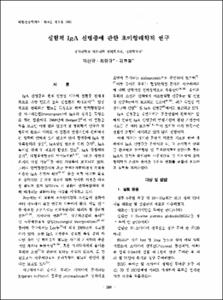실험적 IgA 신병증에 관한 초미형태학적 연구
- Keimyung Author(s)
- Park, Kwan Kyu; Kim, Hyun Chul
- Journal Title
- 대한신장학회지
- Issued Date
- 1995
- Volume
- 14
- Issue
- 3
- Abstract
- IgA nephropathy was induced in a group of ICR mice by oral administration of bovine gamma globulin(BGG) and polio vaccine to clarify the mechanism of immune complex deposits and hematuria morphologically.
The removed kidneys were investigated by light microscopy, immunofluorescent microscopy and electron microscopy.
By direct immunofluorescence, IgA was detected in 26 out of total 30(86.7%) in BGG group, and 21 out of 24(87.5%) in polio vaccine group. Ultras-tructurally, electron dense deposits were noted in mesangium, paramesangium, subendothelium and intxamembranous region. Extracellular destruction was expressed as splitting, thinning, eventual rupture of the basement membrane and mesangiolysis. It is assumed that this ruptured basement membrane may result in hematuria due to leakage of red blood cells. The ultrastructural changes of endothelial cells are edema, destruction of the fenestrated structure and detachment from the mesangial region. Therefore it can be postulated that IgA immune complexes may enter directly into mesangial matrix from capillary lumina through these destructed endothelial cells.
The ultrastructural alterations of glomerular anionic sites were studied using polyethyleneimine (PEI). Prominent common findings in the glomeruli were few PEI particles in electron dense deposits in the mesangial and subendothelial area and marked reduction in glomerular anionic sites covered with deposits. The absence of PEI perticle means loss of anionic sites. So it is suggested that the loss of PEI particle is closely related with change of permeability of capillary basement membrane and cause proteinuria.
- Alternative Title
- An Ultrastructural Study on the Experimental IgA Nephropathy in Mice
- Publisher
- School of Medicine
- Citation
- 박관규 et al. (1995). 실험적 IgA 신병증에 관한 초미형태학적 연구. 대한신장학회지, 14(3), 268–286.
- Type
- Article
- ISSN
- 1225-0015
- Appears in Collections:
- 1. School of Medicine (의과대학) > Dept. of Internal Medicine (내과학)
1. School of Medicine (의과대학) > Dept. of Pathology (병리학)
- 파일 목록
-
-
Download
 oak-bbb-02476.pdf
기타 데이터 / 2.04 MB / Adobe PDF
oak-bbb-02476.pdf
기타 데이터 / 2.04 MB / Adobe PDF
-
Items in Repository are protected by copyright, with all rights reserved, unless otherwise indicated.